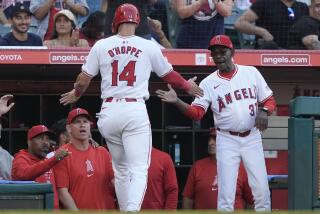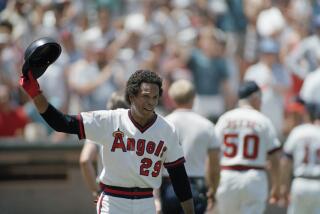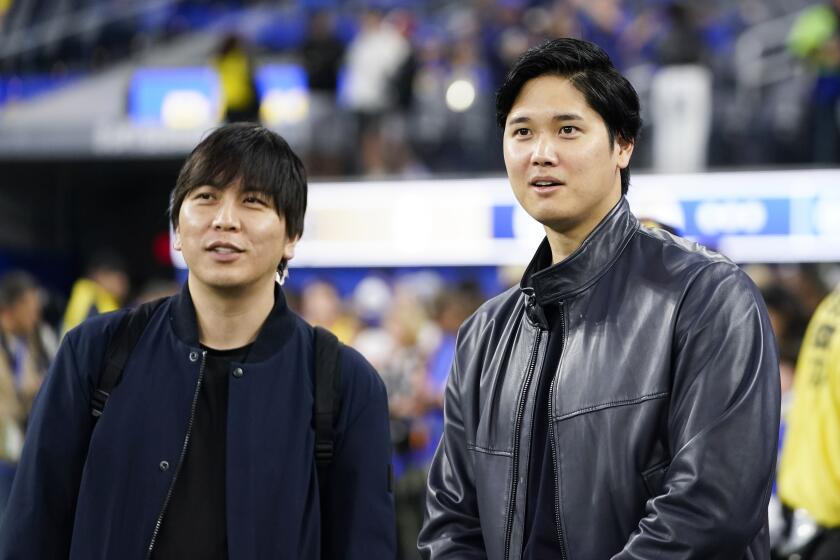Fresh Chance, Fresh Outlook : Greg Walker: After series of injuries and a frightening episode with brain seizures, first baseman tries to come back with the Angels.
MESA, Ariz. — Three years ago, Greg Walker was given a second chance at life. This spring, the Angels are giving him a second chance at a major league career.
After five years of mishap and misery, the clouds hovering over Walker seem to be dispersing. The 31-year-old first baseman never can regain the time he lost to a broken wrist in 1986, and he is still taking medication as the result of two brain seizures he suffered in 1988. Right shoulder and elbow problems led him to develop bad throwing habits, which led to more pain and surgery on his shoulder in 1989 and elbow last August--a month after he was released for the second time that season.
Instead of bemoaning how much he has lost, Walker is concentrating on all he has to gain since the Angels signed him to a triple-A contract last month. Hesitant to call his strong early showing a guarantee he will make the club, Walker is grateful simply to wear a major league uniform again.
“I’ve had a lot of things go wrong. I’ve had a lot of things go right, too,” Walker said.
“I’m not bitter about the fact things have gone wrong. Sometimes I’ll be looking back and I’ll think, ‘Did all that really happen?’ ”
Walker is probably better remembered for the seizure he suffered during batting practice before a game against the Angels at Comiskey Park on July 30, 1988, than for the impressive years he had for the Chicago White Sox in the 1980s. A left-handed hitter, Walker averaged 22 home runs and 78 runs batted in from 1984-87 and provided reliable defense at first base. Before last season, he had a .262 career batting average and 113 home runs in seven seasons.
All of that was nearly forgotten because of one frightening moment.
“As far as my career is concerned, that one instance (the seizure) has had the least to do with it,” Walker said, referring to his release from the White Sox early last season and again in July from the Baltimore Orioles.
“I had a bad shoulder since I played high school football and it degenerated, so I started throwing with bad mechanics, which led to a bad elbow. I had the same surgery (Dodger pitcher Orel) Hershiser had. Dr. (Frank) Jobe fixed it, and I feel very confident that he helped it a lot.
“People hear about all the things that have happened to me and maybe they wonder. And I know last year I didn’t have success. But I wouldn’t be here if I didn’t think I could do the job. I’m not here to hang on. At any point, if I feel or they feel I can’t do it, I won’t be here.”
He has had no recurrence of the seizures that shook him on the field that day and again the next day in a suburban Chicago hospital. After the first episode, it took four trainers, including Rick Smith of the Angels, to ensure that Walker could breathe and wouldn’t swallow his tongue. “It was a real powerful experience,” Smith said.
The seizures eventually were attributed to a viral infection in Walker’s brain, but not before he was told to expect the worst.
“At first, the doctors thought I had a brain tumor, and that’s what they told me,” Walker said. “After a while, they figured out I didn’t have a tumor. You start thinking about what you ate, whether it might have been caused by an aspirin. After a while, you just go on with your life.
“When it happened, I thought, ‘I’ll never forget this.’ It would have been something different if it would have continued to happen and if the medicine didn’t stop it. If it would have happened my whole life, that would be different, too. I feel fortunate it was just two days in my life. I look at it as being real ill for two days.
“It happened on the baseball field, in public view, so it got sensationalized. But I don’t have any bad feelings about that. It’s amazing how many people told me they have seizures or know people who did and told me, ‘My mother had one.’ Time after time, people were telling me.”
The medication he takes is a small but constant reminder of that interlude, and even that reminder soon will disappear.
“I’m at the point where all the tests show I’m completely recovered, and it’s time to go off the medicine,” he said. “The doctors told me after a seizure, there’s a certain amount of time you have to stay on medication. This winter, I had tests done and they showed everything was normal. You have to be tapered off the medication, and the doctors thought it would be easier to do that in the off-season. By the end of the year I’ll be completely off.”
By then, Walker hopes to have a full season with the Angels behind him. Manager Doug Rader sees him as a backup for Wally Joyner, as well as a pinch-hitter and designated hitter.
“It’s yet to be decided whether he’s regained enough bat speed and arm strength to the point where he can help at this level,” said Rader, who knows Walker from his years as a White Sox coach. “The bottom line is we’re all pulling for the guy because he’s as good a human being as ever walked the face of the earth.”
Because of Rader, Walker paid attention when the Angels showed interest in him.
But if Walker stays, and it’s increasingly likely that he will, it will be because of his efforts. In addition to regular drills, Walker takes extra batting practice and extra ground balls daily and comes back happily for more.
“All the coaches have been super. I’m not Wally Joyner or Dave Winfield, one of the studs, and the coaches don’t have to give me extra work, but they give me all I want,” Walker said. “I came in here, not one of the main guys, and they could have pushed me aside, but they haven’t.
“I’d love to be a big part of this team. I think we have a chance of having a great club, and I think I can help. I have to prove it to them and they have to want my services. If I have a good spring training, I think I will fit in.”
More to Read
Go beyond the scoreboard
Get the latest on L.A.'s teams in the daily Sports Report newsletter.
You may occasionally receive promotional content from the Los Angeles Times.







